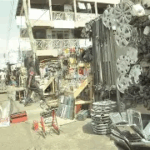
The Ghana Union of Traders Association (GUTA) has thrown its weight behind spare parts dealers at Abossey Okai in Accra, who have directed foreign nationals operating in the area to vacate their shops by Wednesday, September 10, or face forceful eviction.
The group, which embarked on a sensitisation exercise on Monday, said the move is necessary to protect Ghanaian traders from collapsing under what they describe as unfair competition.
Speaking on News Desk, Head of the Business and Economic Bureau at GUTA, Charles Kusi Appiah-Kubi, maintained that their actions are lawful and in the best interest of the country.
“There is no ambiguity in what we are doing. We are so clear in our minds that this is for Ghana, and we are doing it for Ghana. The time has come for us to rise to the occasion to ensure that we reduce the rate at which local businesses are collapsing,” he said.
While acknowledging the importance of foreign investment to Ghana’s economy, Mr. Appiah-Kubi argued that some foreigners operating in the retail sector are violating the law and harming local businesses.
“Yes, as a country, we need foreign investors, but at what point is it at the detriment of local businesses? When you go to other sectors, the foreigner probably might have registered with GIPC as a sole trading, which is allowed by law. But they come to the market to subvert the process and the flow of trade,” he explained.
Meanwhile, the Ghana Investment Promotion Centre (GIPC) has urged restraint, cautioning that shutting down foreign-owned shops should not be the immediate course of action.
“Closing down the shops is not the right step immediately. We believe that the right step immediately will be a lot more consultations and a lot more awareness and education on the areas reserved for Ghanaians,” GIPC CEO, Simon Madjie, said.
Mr Madjie emphasised that the law clearly reserves certain aspects of trading for Ghanaian citizens only.
“The law is very clear on areas that are reserved for the citizens of Ghana. That includes trading in the markets or retail, and then trading with stalls, and also hawking. These are exclusively reserved for Ghanaians. So yes, we can understand some of the concerns that they have,” he noted.
He further revealed that GIPC has engaged with GUTA executives and visited the market to address the concerns.
“The market is managed by the district assemblies. And so, the district assembly and the district security committee will be in the right position to understand who comes in, who goes out, and how this could be managed. And that’s what we are trying to do,” he explained.
The ongoing tensions highlight the growing struggle between protecting local traders and maintaining a welcoming environment for foreign investors in Ghana’s retail sector.